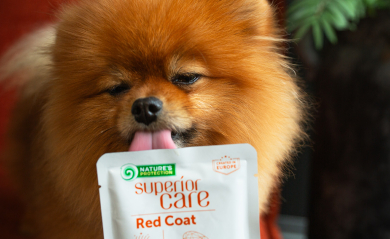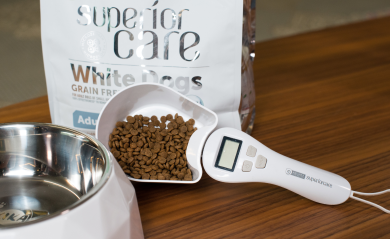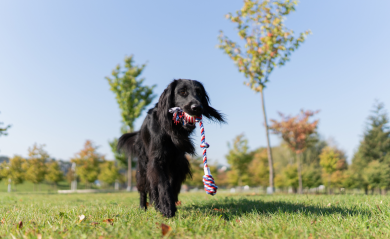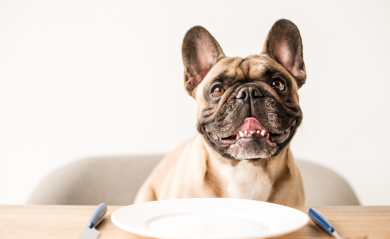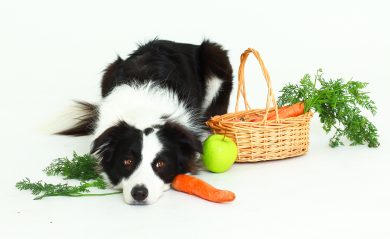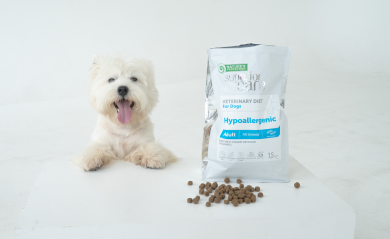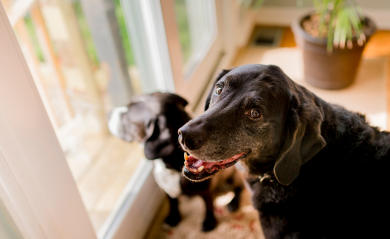Why do puppies get diarrhea and how to treat it?
As a responsible pet owner, it is crucial to be equipped to handle occasional episodes of diarrhea in your pet. In puppies, this condition can arise from various factors, including stress, viral or parasitic infections, or changes in diet or lifestyle. While mild cases can be managed at home, severe instances may necessitate prompt veterinary care. It is imperative to understand the underlying causes and potential hazards of diarrhea in dogs, enabling you to take informed action and ensure your beloved pet's continued well-being.
Why do dogs get diarrhea?
Diarrhea may be caused by many different factors and before applying treatments – it's important to know the reason behind it.
Internal Parasites
GI parasites are a prevalent contributor to diarrhea in young puppies. These parasites, which include worms, protozoa, and coccidia, are not visible to the naked eye and require microscopic examination. Even if the parasites themselves cannot be observed, their eggs may be detected in the stool. As a result, veterinarians typically conduct fecal tests as part of their initial evaluation.
Due to their vulnerable immune systems, young puppies are at an increased risk of GI parasites, which can deplete essential nutrients and lead to symptoms such as poor coat quality, slow growth, vomiting, diarrhea, and a distended abdomen. As dogs mature, they develop some natural immunity to these parasites.
Reactions to food or ingesting something dangerous
If your pet is experiencing diarrhea, it's important to investigate whether there have been any recent changes in their diet, treats, or exposure to human foods. Introducing new foods or ingredients can lead to digestive disturbances and diarrhea. It's crucial to note that some foods, such as those that are high in fat or toxic to dogs, can be harmful to their health. It's also possible for dogs to develop intolerances or allergies to specific dietary components.
When assessing the possible origins of diarrhea in dogs, it's vital to expand beyond their food intake. Young dogs have a propensity to explore their surroundings using their mouths, which can lead to the ingestion of various hazardous substances or foreign objects that trigger diarrhea. This can include items such as poisonous plants, pesticides, plastic fragments, or discarded waste. Due to their playful and curious nature, it's crucial to recognize the potential for exposure to these toxins both indoors and outdoors.
Bacterial or viral infections
Bacterial infections of the gastrointestinal tract are a prevalent source of diarrhea in dogs and can result from the ingestion of tainted food or water. These infections can stem from several bacterial strains, including Listeria, Salmonella, Clostridium, and E. coli. Symptoms of these infections may include diarrhea, among other things.
Parvovirus is a highly contagious viral infection that commonly induces diarrhea in puppies. This virus spreads through contact with infected dogs or contaminated environments, feces, or people. If not appropriately treated, it can be fatal. Other viral infections that can lead to diarrhea in dogs include Canine Adenovirus-1, Canine Distemper Virus, and Canine Coronavirus (which is not related to the coronavirus responsible for COVID-19).
Stressful environment or situations
Apart from severe causes, even stress can trigger diarrhea in dogs. As dogs thrive on routine, it's essential to maintain a consistent schedule and make changes gradually to avoid overwhelming their delicate digestive system.
There are various causes of diarrhea in dogs, with stress and unusual food consumption being some of the most prevalent ones. Luckily, if stress or dietary changes are the culprits, the diarrhea will usually subside within 24 to 48 hours. However, it's crucial to seek advice from a veterinarian if the diarrhea persists beyond 48 hours or if other concerning symptoms manifest.
Why is diarrhea so dangerous?
It's essential to bear in mind that puppies are small and have limited reserves to aid them in case of health issues. Diarrhea, particularly when accompanied by vomiting or loss of appetite, can lead to a rapid decline in their condition. Knowing how to react when faced with a puppy experiencing diarrhea is crucial.
If your puppy has any of the following risk factors, seek immediate veterinary care or contact an emergency on-call veterinarian:
- Being under four months old
- Belonging to a toy breed
- Experiencing vomiting in addition to diarrhea
- Bloody diarrhea
- Abdominal pain
- Weakness
- Lethargy
- Poor appetite
- Pale or tacky gums, indicating dehydration, anemia, or shock
- Watery diarrhea lasting for more than a day
It's always better to err on the side of caution when it comes to the well-being of your furry companion.
When to seek a veterinarian?
If your dog is experiencing diarrhea, it is crucial to seek veterinary advice on the best course of action. Puppies may need different medication dosages than adult dogs, and your veterinarian can help you determine appropriate treatment options. Hospitalization may be necessary in certain cases. Acute diarrhea treatments may include fluid therapy to avoid dehydration, medications to manage vomiting and slow bowel movements, antibiotics to combat bacterial infections, and close monitoring for seriously ill dogs. Your vet may also conduct tests, such as checking for parasites or the presence of parvovirus, to identify the underlying cause of diarrhea.
How to treat puppy diarrhea?
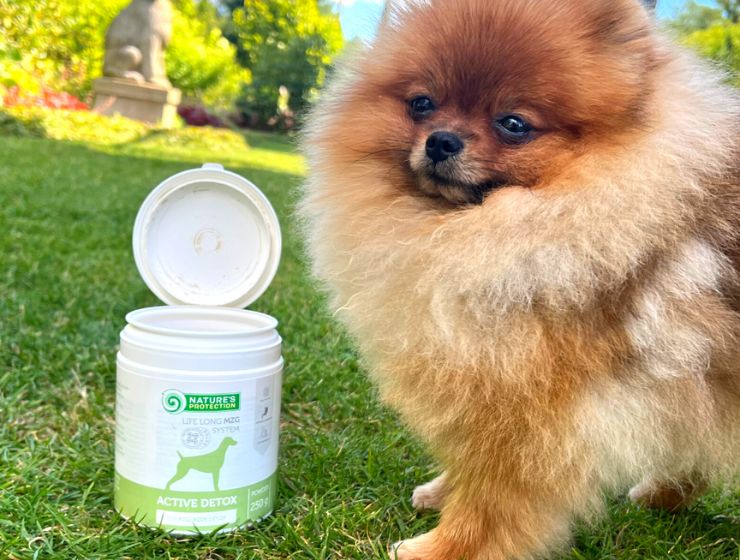
When it comes to providing fresh water for your puppy, it's important to remember that puppies can quickly become dehydrated if they have diarrhea. Dehydration can worsen your puppy's condition and cause other complications. If your dog does not want to drink water – offer him some Nature’s Protection Superior Care soup.
In terms of feeding, it's important to follow your veterinarian's specific recommendations for your puppy's diet. Choosing high-quality food that is easily digestible, hypoallergenic, and provides your puppy's body with all essential nutrients can help prevent future episodes of diarrhea.
Cleaning your puppy is also an important step in managing diarrhea. If your puppy has smudged itself with liquid feces, wash it with natural skin and coat care products. Feces can contain bacteria or parasites, so it's important to remove them from your puppy's fur and maintain good hygiene. Grooming tools can also help you to keep the fur clean. After bathing, comb the coat well to check for fecal remains and wash the fur again if there are any.
Finally, your veterinarian may recommend supplements or medications, such as canned pumpkin, Microzeogen powder, kaolin-pectin, or probiotics, to help your puppy's digestive system. Canned pumpkin is a good source of fiber, which can help regulate bowel movements. Microzeogen powder is a natural element that helps remove toxins from the body. Kaolin-pectin is a combination of ingredients that can help soothe the digestive system. Probiotics are beneficial bacteria that can help restore balance to the gut microbiome. It's important to follow your veterinarian's instructions carefully when giving your puppy any supplements or medications.
In summary, managing a puppy with diarrhea can be challenging, but with proper care and guidance from your veterinarian, most cases can be resolved quickly and effectively. Be sure to follow your vet's specific instructions for your puppy's care, and don't hesitate to contact them if you have any concerns or questions.


 July 06, 2023
July 06, 2023
 0 comments
0 comments



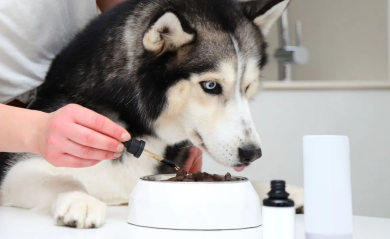
 March 26, 2025
March 26, 2025
